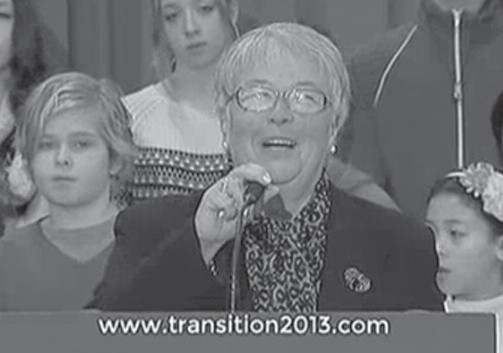Taps Ed. Veteran Fariña To Replace Walcott
Incoming Mayor Bill de Blasio announced veteran educator Carmen Fariña as the city’s schools chancellor during a press conference in Brooklyn on Monday, Dec. 30.

Fariña has worked as a teacher, administrator and policy-maker.
She also acted as an informal adviser to the incoming mayor and served as superintendent to the same Brooklyn school district where de Blasio sat on the school board in the early 2000s.
“To me this is literally one of most important decisions I will make as mayor,” de Blasio said during the announcement.
Fariña has worked in the New York City public education system for 40 years, first as a teacher and principal and later as a superintendent in 2001.
She was appointed deputy chancellor of teaching and learning in 2004 under then-Chancellor Joel Klein and Mayor Michael Bloomberg’s administration.
Fariña retired from the post two years later, saying she wished to spend time with family. News reports at the time indicated that her educational philosophy also diverged from the administration’s.
“She didn’t want to continue policies that she didn’t believe in,” de Blasio said during Monday’s announcement.
Recent reports have characterized Fariña as a leader who would counteract many of Bloomberg’s most divisive policies.
In the past Fariña has criticized the weight given to standardized tests when evaluating schools and teachers.
“We will do everything within power to reduce focus on high-stakes testing,” de Blasio said Monday.
After retiring from the DOE in 2006, she led opposition to charter schools opening in the Cobble Hill section of Brooklyn where she lived, Capital New York reported.
How she may reshape the city’s schools is yet to be seen, but some have suggested she was chosen for an ability to shake things up.
Capital also reported that, while serving as principal of P.S. 6 in Manhattan, Fariña replaced 80 percent of her staff in eight years.
When she took control, the school ranked 76th in the city, and in a decade, she transformed it into a topten school, de Blasio said Monday.
During the announcement, Fariña kept tight-lipped on specific policy changes she’s eyeing, but she did say that the DOE will “streamline the avenue of where parents can go for information,” adding that the Division of Family and Community Engagement will be the first DOE office to be restructured.
Fariña and de Blasio indicated Monday that the administration would avoid unilateral changes to the school system.
She said changes should come “from the stance of a progressive agenda” adding that they would need to be made “with people, not to people.”
Fariña said will create a system where parents are treated as partners.
De Blasio said the moratorium on new school closings and co-locations will remain in place, and schools that have already entered the process will be scrutinized “without preconceived notions.”
The mayor-elect also said he is adamant about resolving almost 150 open labor contracts with teachers unions, calling the situation “unfortunate” and vowing to resolve it in spirit of partnership.
Fariña said she aims to improve teacher training and will seek a “profoundly different approach” than Bloomberg, vowing to return a sense of joy to the teaching profession- something she charged has been absent in recent years.
The new chancellor, whose parents emigrated to New York from Spain, said she will make sure Spanish-speaking families are better served.
Fariña intends to create more informational resources for Spanishspeaking parents while also advocating they keep the language alive at home.
There was no announcement whether de Blasio would relinquish control of the school system, but the mayor-elect indicated he’d like to strengthen the role of local community education councils (CEC) and district superintendents.
Nick Comaianni, who heads the District 24 CEC reacted Monday, saying the group supports Fariña’s appointment.
“Carmen was always fair hellip; she would actually sit down and discuss stuff-at least under the old system,” he said.
He said he was concerned whether he stress might be too much for the 70-year-old, and reporters Monday inquired how long the public can expect Fariña to keep the office.
“I don’t do anything half way. If I take a job, I take a job,” Fariña said without indicating exactly how long her tenure might last. “My commitment is total.”
Short of an end to mayoral control-something Fariña could not enact-Comaianni said he’d like to see the new chancellor return more power to individual school districts.
“Let the community have more say in policy changes within their districts,” he said.
Comaianni said, Dec. 30, the CEC has been in contact with de Blasio’s transition team and is expecting a dialogue when the mayor-elect takes office Jan. 1. At that point, the CEC will begin a dialogue with Fariña as well.
“I’m looking forward to her calling a meeting,” he said.


































